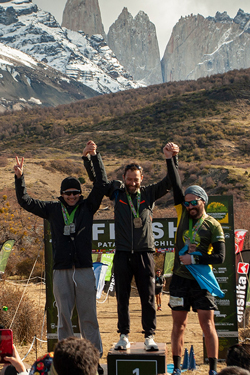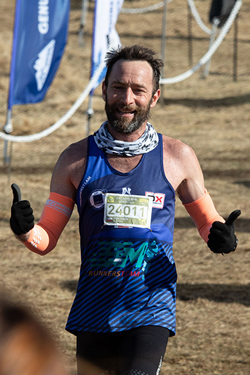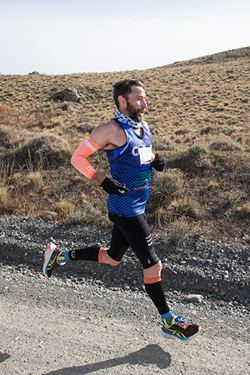Recommendations for the days leading up to the race:
reduce, hydrate, eat and sleep
Benjamín Maturana is one of Patagonian International Marathon’s most-distinguished runners. The 21K runner has reached the podium seven times over the years, four of which he finished as champion: 2014, 2015, 2016 and 2021. His best overall time was in 2014, where he won the race by completing it in 1:18:45. Last year, on the tenth anniversary, he finished the race in 1:21:43 and finished second overall.



Benjamín Maturana (21K Runner) Running Patagonian International Marathon® 2022
The experience he has accumulated over almost a decade has transformed this physical education teacher and director of BM Runners Team into a connoisseur of our event: he has competed with runners from various countries around the world in addition to facing the restless and volatile climate of Torres del Paine. In this blog, he provides runners with some important tips he has learned over the years:
How much should I train during the week leading up to the event?
“Ideally, you want to reduce your workload, whether it’s the volume of training or the intensity. I recommend beginning to actively cut back or reduce 48 hours before the competition. In other words, you should complete lighter training sessions and focus on activating and warming-up the body during the few days leading up to the race. You could passively cut back instead, but that depends on the preference of each individual runner. Regardless, the most important thing is to reduce the load, as this will allow us to recover and regenerate our different body systems.”
I recommend beginning to actively cut back or reduce 48 hours before the competition.
Should I worry about my nourishment this week?
“Taking care of our diet before a big race is equally or more important than our physical and psychological state. Our body will be subjected to a big undertaking for serveral hours, so it’s very important to have our ‘tanks’ filled with all the necessary nutrients to help us reach our peak performance.”
What should I consume and not consume?
“Nutritional strategies should be tested during your training sessions before the race, and when possible, you shouldn’t experiment with anything new the day before the competition. Having said that, I believe it’s very important to recharge your body with glycogen (carbohydrates) in the days leading up to the marathon to ensure reaching 100% (muscular and liver) storage on the day of the competition. This will provide us with the necessary energy needed for optimal performance.
For example, 48 hours before the race, you can consume pork or chicken, or even eat a fatty lunch. It’s also recommended to eat a banana and a good variety of fruits and vegetables. You should drink more water than normal to achieve (and maintain) clear urine throughout the day. On race day, it’s importannt to hydrate at each refreshment station.
24 hours before the race, I suggest eating a breakfast rich in cereals with honey and fruits. That can be very beneficial. For lunch, it’s not recommended to consume red meat, but a good amount of pasta, rice or any other carbohydrate is recommended. It’s also important to lower the intake of vegetables and fruits, since they can overstimulate digestion. At night, I think it’s ideal to eat some unprocessed dough, such as pasta or rice, in order to avoid discomfort, maybe adding some shredded chicken. And you have to continue to stay hydrated.”
I believe it’s very important to recharge your body with glycogen (carbohydrates) in the days leading up to the marathon to ensure reaching 100% (muscular and liver) storage on the day of the competition.
What foods are recommended for race day?
“A hearty breakfast should be consumed at least two hours before the race. For example, you could eat coffee with sugar and maybe some jam/toast. In general, it’s good to stick with the same breakfast diet as used during your training sessions. It’s very important to keep a pattern. Later, during the competition, carbohydrates with a high glcemic index should be ingested, since they will quickly provide us with energy, such as raisins, bananas, honey or gels. The recommendation is to consume a glucose gel every 45 minutes AFTER the first hour of competition. At the end of the race, it’s important to maintain good hydration, so it’s recommended to consume isotonic drinks and recover your energy, maybe by eating a good plate of pasta.”
How many hours of sleep should I receive the night before the race?
“I recommend that you have a good rest 48 hours before the race. It’s important, as you will most likely be nervous the night before the race and not be able to rest properly. If possible, you should sleep between 8 and 9 hours and ensure that it it’s a restful, uninterupted rest.
How can I overcome those pre-race nerves?
“There are meditation methods, conscious breathing techniques and visualizing the objective. In other words, visualizing the route. But you need to remain as relaxed as possible, because the most important thing to do is trust your abilities and the training processes that brought you to this competition.
What is the ideal clothing for the race?
“I suggest using the same shoes that you used for training, as long as they are in good condition. In other words, they have not exceeded the total recommended number of kilometers according to the brand. I don’t think it’s necessary to wear trail shoes, and you can just wear the same ones that you would use for a street race. I also recommend wearing technical clothing: first layer, windbreaker, gloves, hat and maybe running tights/pants.”
I don’t think it’s necessary to wear trail shoes, and you can just wear the same ones that you would use for a street race.







